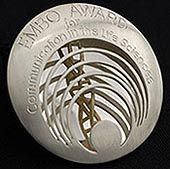An award for young scientists in a young discipline
systems biology is a young field. It has the potential to fundamentally change the life sciences and generate radically new insights for biomedical research as well as for industry and agriculture. Its overall aim is to better understand life processes. Systems Biology strives to create a holistic picture of dynamic life processes with regard to all levels - from the genome via the proteome and the organisation of the cell organelles all the way to the complete cell or even an entire organism. In order to achieve to this high aspiration, Systems Biology combines quantitative methods used in molecular biology with knowledge gathered in mathematics, informatics and systems science.
During the second Conference on Systems Biology of Mammalian Cells (SBMC), which will take place May 22 - 24, 2008 in Dresden, Germany, the MTZ®-Award for medically-oriented Systems Biology will for the first time be presented to young scientists. The award acknowledges outstanding dissertations in the field of medical Systems Biology and is granted by the MTZ® foundation in cooperation with the Federal Ministry of Education and Research (BMBF) and the Project Managament Jülich (PtJ).
"We are proud to promote an innovative scientific discipline" says Thomas Zimmermann, co-founder of the MTZ® foundation. He continues: "It is of special importance to us to support gifted and motivated young talents who are key to the future of Systems Biology.To this end the MTZ foundation, in co-operation with the Federal Ministry of Education and Research (BMBF) and the Project Management Jülich (PtJ), has created the MTZ®-Award for medically-oriented Systems Biology which honors outstanding dissertations. The jury consists of leading representatives of Systems Biology research in Germany.
The prize sum of 5000 Euro can be divided and will be granted to the three best dissertations. The formal presentation of the prize will take place during the conference "Systems Biology of Mammalian Cells" on May 23rd, 2008, in the Kulturpalast in Dresden.
Other news from the department science

Get the life science industry in your inbox
By submitting this form you agree that LUMITOS AG will send you the newsletter(s) selected above by email. Your data will not be passed on to third parties. Your data will be stored and processed in accordance with our data protection regulations. LUMITOS may contact you by email for the purpose of advertising or market and opinion surveys. You can revoke your consent at any time without giving reasons to LUMITOS AG, Ernst-Augustin-Str. 2, 12489 Berlin, Germany or by e-mail at revoke@lumitos.com with effect for the future. In addition, each email contains a link to unsubscribe from the corresponding newsletter.


















































